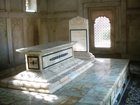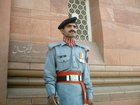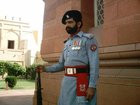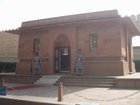Muhammad Iqbal
|
|
AllamaIqbalyoung.jpg
Allama Dr Sir Muhammad Iqbal (November 9, 1877-April 21, 1938) was an important Indian Muslim poet from the colonial era, a philosopher and thinker of Kashmiri origin. A major Urdu and Persian writer, he is in the unusual position of having penned one of India's major national songs (Saare Jahan Se Achcha) while at the same time being credited as a major force behind the creation of Pakistan. He is posthumously revered in Pakistan as Muffakir-e-Pakistan (The Thinker of Pakistan) or Shair-i-Mashriq (The Poet of the East). Along with Muhammad Ali Jinnah he is considered one of the preeminent founding fathers of Pakistan, arguably having convinced Jinnah to return from England and lead the movement demanding a separate homeland for South Asia's Muslims when Britain granted independence to the region. (Jinnah had practically gone into self-exile after having given up on trying to get the national secular and Muslim leaderships to work together.)
| Contents |
Family Background
There is some controversy regarding the migration of his grandfather from Kashmir. Iqbal's grandfather Shaikh Rafiq, was a Kashmiri Pandit named Sahaj Ram Sapru before his conversion to Islam and was a revenue collector. Iqbal's father Shaikh Nur Muhammad was a tailor whose handiwork was quite well known in Sialkot. But it was his devotion to Islam, especially its mystical aspects, that gained him respect among his Sufi peers and other associates. His wife, Imam Bibi, was also a devout Muslim. The couple instilled a deep religious consciousness in all their five children. For a detailed treatement of various theories regarding Iqbal's family background see Theories on Muhammad Iqbal's family background.
Youth
UIqbal.jpg
Allama Iqbal was born on November 9, 1877 in the city of Sialkot. His initial education was in Sialkot. Iqbal's potential as a poet was first recognized by one of his early tutors, Sayyid Mir Hassan, from whom he learned classical poetry. Mir Hassan never learned English, but his awareness of the merits of Western education and his appreciation of modernity ensured him a position as Professor or Oriental Literature at Scotch Mission. He was Iqbal's tutor until his graduation in 1892.
It was also in 1892 that Iqbal was married to Karim Bibi, the daughter of an affluent Gujarati physician. They separated in 1916, but Iqbal provided financial support to Karim Bibi until he died. The couple had three children.
In 1885, after completing his studies at Scotch Mission, Iqbal entered the Government College in Lahore, where he studied Philosophy and Arabic and English Literature for his Bachelor of Arts degree. He was an excellent student, graudating cum laude and winning a gold medal for being the only candidate who passed the final comprehensive examination. Meanwhile, he continued writing poetry. When he received his Master's degree in 1899, he had already begun to make his mark among the literary circles of Lahore.
While reading for his Master's degree, Iqbal became acquainted with a figure who was to have a strong influence on his intellectual development. Sir Thomas Arnold, an erudite scholar of Islam and modern philosophy, became for Iqbal a bridge between East and West. It was Arnold who inspired in him the desire to pursue higher studies in Europe.
One influence on him was Sir Sayed Ahmad Khan.
Iqbal in Europe
TheThinker.jpg
In 1903, he went to Europe and began studies at Cambridge. While in England he also was able to practice law, which he did through Lincoln's Inn. At Cambridge, he crossed paths with other great scholars who further influenced his scholastic development. Under their guidance, Iqbal refined his already considerable intellect and widened his mental horizon. After staying in the United Kingdom, he then went on to study at the University of Munich. He earned a Ph.D. with a thesis on the "Development of Metaphysics in Persia", his only other English work being the Reconstruction of Religious Thought in Islam in 1928. While in Europe he also began to write his poetry in Persian, because it allowed him to reach a wider audience i.e., Iran and Afghanistan; but he finally decided on sticking to Urdu since most Indians did not understand Persian.
It was while in Britain that he first went into politics. Following the formation of the All-India Muslim League in 1906, Iqbal was elected to the executive committee of the league's British chapter. Together with two other leaders, Sayyid Hassan Bilgrami and Sayyid Amir Ali, he also sat on the subcommittee which drafted the league's constitution.
Return to the Subcontinent
Upon his return to India from Europe in 1908, Iqbal embarked on a career in law, academics and poetry, all at once. Of the three pursuits, he excelled in what was his true calling and first love--poetry. There is a widely held belief that had the Government College in Lahore been more generous with their monthly stipend and academic freedom, he would have been as brilliant an academician as he was a poet. In fact, it was financial considerations that forced him to relinquish his assistant professorship in 1909 to take up a fulltime law career. But he did not earn much as a lawyer either, although he could have. Instead of concentrating on the profession, he preferred to divide his time between the law and his own spiritual development. Already a famous poet by then, Iqbal received a knighthood from the British Government in honour of the brilliant Asrar-i-Khudi.
While dividing his time between the law and poetry, Iqbal, with the encouragement of friends and supporters, decided once more to enter the political arena. In November 1926, he contested a seat in the Muslim District of Lahore and beat his opponent by a wide margin of 3,177 votes.
In 1931, Iqbal made a second visit to Europe to renew old acquaintances and make new ones and to reflect and write. He attended conferences in Britain and met various scholars and politicians, including the French philosopher Henri Louis Bergson and the Italian dictator Mussolini. A visit to Spain inspired three beautiful poems, which were later incorporated into a major composition, Bal-I Jibril (Gabriel's Wing).
Iqbal_in_center.jpg
Influences
Amongst the Western Thinkers, Iqbal was deeply impressed by Nietzsche. Some people have criticized Iqbal for endorsing Nietzsche's concept of the Übermensch (superman) which is reflected in Iqbal's own concept of "The perfect man." However Iqbal asserted that his concept of the perfect man is influenced by Jami and Rumi. Bergson's ideas regarding time also influenced Iqbal. Iqbal wrote Payam-i-Mashriq (The Message of the East) as a reply to Goethe's West-östlicher Diwan. Iqbal praised Goethe in the same book and considered him to a poet of the first rank. Amongst the Eastern thinker's Iqbal was influenced by Moulana Rumi, whom he called his spiritual guide. Iqbal's also admired Mirza Ghalib's poetic style.
Major Works of Iqbal
- Works of Poetry (Urdu & Persian)
- Asrar-i-Khudi (The Secrets of the Self) (1915)
- Rumuz-i-Bekhudi (The Secrets of Selflessness) (1918)
- Payam-i-Mashriq (The Message of the East) (1923)
- Bang-i-Dara (The Call of the Bell) (1924)
- Zabur-i-Ajam (Persian Psalms) (1927)
- Javed Nama (Book of Eternity) (1932)
- Ball-i-Jibril (Gabriel's Wing) (1935)
- Zarb-i-Kalim (The Staff of Moses) (1936)
- Pas Chih Bayad Kard ay Aqwan-i-Sharq (What should be done O people of the East) (1936)
- Armagan-i-Hijaz (Gift from Hijaz) (1938)
- Prose Work
- Reconstruction of Religious Thought in Islam (1930)
- The Development of Metaphysics in Persia (1908)
- Ilm-Al Iqtisad (The subject of Economics) (1903)
Later Years and Death
After returning from a trip to Afghanistan in 1933, Iqbal's health deteriorated. But his religious and political ideas were gaining wide acceptance and his popularity was at its peak. One of the last great things he did was to establish the Adarah Darul Islam, an institution where studies in classical Islam and contemporary social science would be subsidized. It was perhaps the last wish of a great man who was fascinated with the yoking of modern science and philosophy to Islam, to create bridges of understanding at the highest intellectual level. This thought he expressed thus:
In the East, Love is the basis of life.
Through Love, Intellect grows acquainted with Reality,
And Intellect gives stability to the work of Love,
Arise and lay the foundations of a new world,
Iqbal died on April 12, 1938 in Lahore, India (in what after 1947 became a part of (Pakistan). He is buried in the space between the entrance of the Badshahi Mosque and the Lahore Fort (which face each other) in that city. The Pakistan government maintains an official guard at the mausoleum.
Legacy of Iqbal
Iqbal is considered to be one of the greatest poets of the Urdu language, admired both in India and Pakistan. He is also highly regarded for his Persian poetry, both in the Subcontinent and in Iran itself. He is considered to be one of the most important Muslim thinkers of the last few hundred years. The Iranaian social scientist Ali Shariati was deeply influenced by Iqbal.
Iqbal's lectures Reconstruction of Religious Thought in Islam are banned in Saudi Arabia. Iqbal also wanted to write a book, "The Book of a Lost Prophet, similar in style to Nietzsche's Also sprach Zarathustra. However he died before he could start this project. His books have translated into Arabic, English, French, Spanish, Czech, Russian and other languages.
Allama Iqbal International Airport (formerly Lahore International Airport) was recently renamed for him).
- See also
- Urdu poetry, List of Urdu poets
Quotes on Iqbal
- "Iqbals death creates a void in literature that like a mortal wound will take a long time to heal." Tagore on Iqbal's Death
- "The greatest advice of Iqbal to humanity is: Have a heart like Jesus, thought like Socrates, and a hand like the hand of a Caesar, but all in one human being, in one creature of humanity, based upon one spirit in order to attain one goal. That is, to be like Iqbal himself."Ali Shariati on Iqbal
External links
Works
- Development of Metaphysics in Persia (http://www.h-net.msu.edu/~bahai/diglib/books/F-J/I/Iqbal/metaphys/iqbfn.pdf), Ph.D. thesis
- Reconstruction of Religious Thought in Islam (http://www.allamaiqbal.com/works/prose/english/reconstruction/) Famous lecture/booklet - Complete text online
- Allama Iqbal Essays: Jaihoon (http://jaihoon.com/iqbal/iqbessays.htm)
- Manas - Sir Muhammed Iqball (http://www.sscnet.ucla.edu/southasia/History/British/Iqbal.htm)
- Audio Video files of IQBAL (http://www.allamaiqbal.com/person/fnav02_per.html)
Institutions and websites on Iqbal
- Iqbal Cyber Library (http://www.iqbalcyberlibrary.net/)
- Homepage of the Allama Iqbal Acadmey (http://www.allamaiqbal.com/)
- Quotations by Allama Iqbal (http://www.words4ever.net/authors/3032/allama-iqbal-quotations-sayings.htm)
On Iqbal
- A Manifestation of Self-reconstruction and Reformation (http://www.shariati.com/iqbal.html)
- Short introduction to Iqbal as philosopher (http://users.ox.ac.uk/~worc0337/authors/iqbal.html)
- Second Opinion: How Islam is used by us (http://www.dailytimes.com.pk/default.asp?page=story_5-12-2003_pg3_6)
Family history, etc.
- The Sapru family history (http://www.kashmirsentinel.com/may2003/5.html)
- Allama Iqbal-Searching for Pandit Roots (http://www.kashmirsentinel.com/may2003/5.html)
Sources
- Payam-i-Mashriq (The Message of the East) Allama Muhammad Iqbal. Iqbal Academy (1993)ar:محمد إقبال
de:Muhammad Iqbal eo:Muhammad IKBAL ks:मुहम्मद इकबाल sa:मुहम्मद इकबाल




